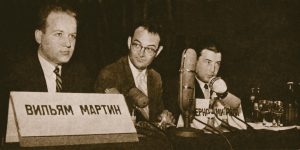
It’s a story filled with uncanny parallels that could be plucked directly from today’s headlines: young men working with the National Security Agency (NSA) who grow disillusioned by what they find, abscond with classified information, and end up seeking asylum in Moscow. Fifty-three years before Edward Snowden left his job as a consultant with the NSA and ultimately pursued refuge in Moscow, a pair of disillusioned NSA employees, William H. Martin and Bernon F. Mitchell, defected to the Soviet Union.
Martin and Mitchell started with the NSA in 1957. According to subsequent government investigations, both may have secretly joined the Communist Party and likely visited Cuba in late 1959. According to authors Christopher Andrew and Vasili Mitrokhin, Mitchell visited the Soviet embassy in Mexico City in December 1959 and asked for political asylum. Despite KGB efforts to persuade him to stay in NSA and serve as an agent, he and Martin insisted that they preferred to defect. On June 25, 1960, Martin and Mitchell boarded a flight from Washington for Mexico City. From there, they traveled subsequently to Cuba and then the Soviet Union. On August 1, the Department of Defense announced that Martin and Mitchell were missing, later acknowledging on August 5 that it was likely that the two men had fled to the Eastern Bloc. On August 11, 1960, William H. Martin and Bernon F. Mitchell were officially granted asylum in the USSR and each awarded a monthly allowance 0f 500 rubles, roughly equal to their NSA salaries.
On September 6, 1960, Martin and Mitchell held a press conference in Moscow to announce their defections. Martin explained their decision as follows:
We were employees of the highly secret National Security Agency, which gathers communications intelligence from almost all nations of the world for use by the U.S. Government. However, the simple act that the U.S. Government is engaged in delving into the secrets of other nations had little or nothing to do with our decision to defect. Our main dissatisfaction concerns some of the practices the United States uses in gathering intelligence information. We were worried about the U.S. policy of deliberately violating the airspace of other nations and the U.S. Government’s practice of lying about such violations in a manner intended to mislead public opinion. Furthermore, we were disenchanted by the U.S. Government’s practice of intercepting and deciphering the secret communications of its own allies. Finally, we objected to the fact that the U.S. Government was willing to go so far as to recruit agents from among the personnel of its allies. (NSA/CSS 60th Anniversary Timeline)
The very next day, September 7, 1960, the House Un-American Activities Committee (HUAC) would launch an investigation of the Martin-Mitchell defections and their potential impact on American national security. HUAC’s investigation would last 13 months, using over 2,000 hours of staff work and producing 16 executive-session (closed to the public) hearings, featuring testimony from 34 current or former NSA employees.
In August 1962, HUAC would release a 23 page report summarizing its findings. Among other things, the report would question the validity of the polygraph as a tool for detecting possible security risks. In a reflection of then prevailing attitudes toward homosexuality, the document also made much of allegations that Martin and Mitchell were gay, citing this as a factor in their defection. Journalist Rick Anderson, however, has shown that Martin and Mitchell were not, in fact, gay.
An NSA historical overview of the case noted that “It is believed that there was very little damage” done to U.S. intelligence efforts as a result of the defection. (“Betrayers of the Trust”) This is confirmed by Andrew and Mitrokhin, who write that the KGB was “disappointed” in the quality of the information supplied by Martin and Mitchell. (Andrew & Mitrokhin, The Sword and the Shield, p. 179) The feeling was soon to be mutual. Despite their relatively generous stipends and both marrying Soviet women, Martin and Mitchell quickly became disillusioned by the realities of life in the USSR. Neither man ever returned to the United States: Martin dying in Mexico in 1987 and Mitchell in Russia in 2001.
Original Sources:
National Security Agency: NSA/CSS 60th Anniversary Timeline – 1960s (includes the transcript and audio of Martin and Mitchell’s Moscow press conference)
Security Practices in the National Security Agency (Defection of Bernon F. Mitchell and William H. Martin). Report by the Committee on Un-American Activities, House of Representatives, Eighty-Seventh Congress, Second Session. August 13, 1962. (Not yet part of CWIS Collection: Available in ProQuest Congressional; ECU users only)
Additional Sources:
Anderson, Rick. ‘Before Edward Snowden: “Sexual deviates” and the NSA‘. Salon, July 1, 2013.
Andrew, Christopher and Vasili Mitrokhin. The Sword and the Shield: The Mitrokhin Archive and the Secret History of the KGB. New York: Basic Books, 1999. (Joyner Stacks UB251.S65 A63 1999)
“Betrayers of the Trust.” National Security Agency Cryptologic Almanac, May-June 2002.